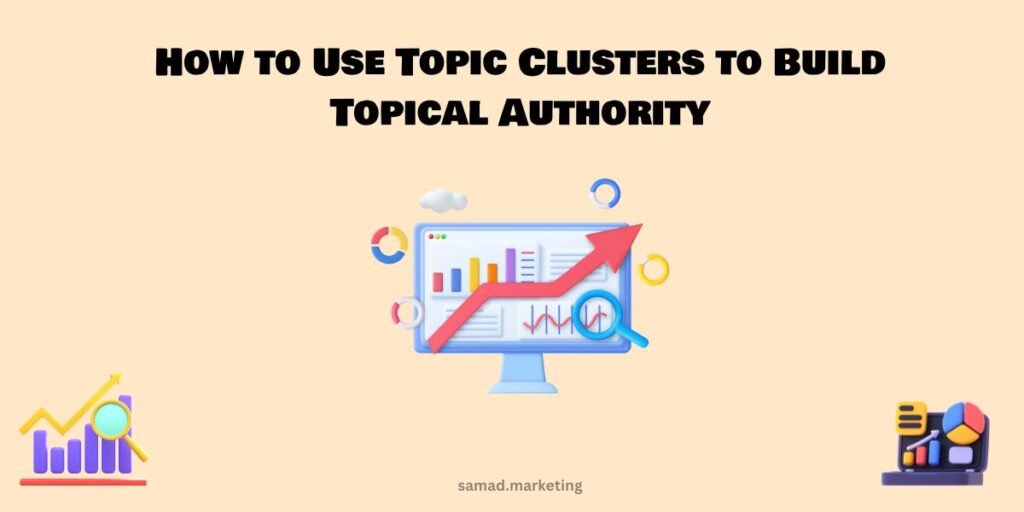Search engines are no longer just matching keywords they’re understanding topics and context. That’s why building topical authority is now one of the most powerful SEO strategies.
A proven way to do this is through topic clusters. In this blog post, you’ll learn what topic clusters are, why they matter for SEO, and how to create them to improve your rankings and establish your website as an expert in your niche.
🧠 What Are Topic Clusters?
A topic cluster is a group of related web pages centered around one main subject. It consists of:
- A pillar page that broadly covers a topic.
- Several cluster pages (or subtopics) that explore specific parts of that topic in detail.
- Internal links that connect all the pages in the cluster.
Example:
- Pillar Page: The Ultimate Guide to SEO
- Cluster Pages:
- On-Page SEO Techniques
- Link Building Strategies
- Technical SEO for Beginners
- Mobile-First Indexing
- Core Web Vitals Optimization
Each cluster page links back to the pillar, and vice versa.
🔍 Why Topic Clusters Matter for SEO
Google now uses semantic search and natural language processing (NLP) to understand the relationship between topics and how in-depth your content is.
Benefits of using topic clusters:
- Improve your chances of ranking for hundreds of related keywords
- Help Google understand your site structure and expertise
- Boost dwell time and reduce bounce rate by encouraging internal navigation
- Strengthen topical authority, which improves rankings across your entire site
📋 How to Build a Topic Cluster Strategy
Follow these steps to build a topic cluster from scratch:
1. Identify a Core Topic (Pillar)
Start with a broad topic that’s relevant to your audience and services.
Examples:
- “Local SEO”
- “Content Marketing”
- “Technical SEO”
- “Ecommerce SEO”
Choose a topic that:
- It is central to your business
- Has enough depth to support multiple subtopics
- Has long-term interest and search volume
2. Do Keyword & Topic Research for Subtopics
Use tools like Ahrefs, SEMrush, Ubersuggest, or Google’s “People Also Ask” to find related questions and keywords.
Break your core topic into specific, focused subtopics.
For example, under “Local SEO,” you might include:
- Google Business Profile Optimization
- Citation Building Strategies
- Local Keyword Research
- Online Reviews Management
- Local Link Building
These become your cluster pages.
3. Create the Pillar Page
This should be a long-form, comprehensive guide (1,500–3,000 words) that gives an overview of the core topic.
Structure it clearly with headings and internal links to each cluster page.
Think of it as the “hub” of the topic—it introduces every major subtopic, then links to the full article on each one.
4. Write and Publish Cluster Pages
Each cluster page should:
- Go in-depth on one specific subtopic
- Target a long-tail or intent-driven keyword
- Answer related questions people are searching for
- Link back to the pillar page (and ideally, to other related cluster pages)
This structure signals to Google that all these pages are part of the same topic, boosting the authority of the entire cluster.
5. Use Internal Linking Strategically
Link each cluster post:
- To the pillar page using keyword-rich anchor text
- To other relevant cluster pages to create a web of context
This boosts:
- Crawlability
- Time on site
- Context for Google’s algorithm
Avoid random linking. Keep it intentional and structured.
6. Keep It Updated
As your industry evolves, update both the pillar and cluster pages with new stats, tips, and trends.
This keeps your content fresh, which Google loves, and maintains your topical authority.
✅ Bonus Tips
- Avoid keyword cannibalization: Make sure each page targets a unique subtopic and keyword.
- Use consistent formatting: headers, meta tags, and structured data should all align.
- Track performance: Use Google Search Console and Analytics to monitor which clusters bring traffic and which need improvement.
- Add schema markup: Enhance SEO by adding schema to FAQs, articles, and reviews within your clusters.
🧭 Final Thoughts
Topic clusters are more than just a way to organize your site—they’re a powerful SEO strategy. They help search engines understand your expertise and give users a better experience by guiding them through related content.
By building out clusters around key topics in your industry, you’ll:
- Increase your rankings
- Attract more targeted traffic.
- Build long-term topical authority.

